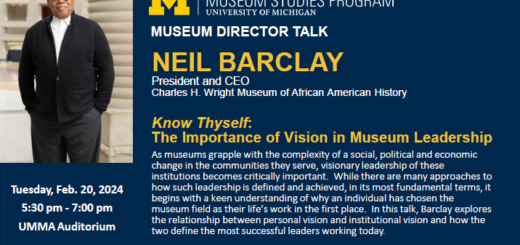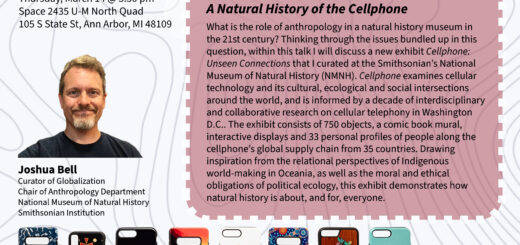Public programs facilitate dialogue between academics and professionals, informing scholarship and strengthening practice.
Multiple day conferences, year-long colloquia, individual lectures, “conversations” between individuals, hands-on workshops, and Museums at Noon talks featuring our graduate students all contribute to the remarkable richness of MSP offerings.
Video recordings of some MSP lectures are archived for viewing in our Media Gallery.
Museums at Noon
The Emperor’s New Ethnography: Debates at the Musée africain de Lyon
University of Michigan Museum of Art, First Floor, Multi-Purpose Room 525 South State Street, Ann Arbor, MI, United StatesAbigail Celis (PhD candidate, French Language and Literature) How do you do new ethnography with old tools? Ethnographic museums, in the past two decades, have been dancing a funny limbo. The academic fields that shaped them have abandoned many of the methods and primary...
Gentrifiers or community anchors: are art museums good for urban neighborhood residents?
University of Michigan Museum of Art, First Floor, Multi-Purpose Room 525 South State Street, Ann Arbor, MI, United StatesJustin Meyer (PhD candidate, Urban Planning) My dissertation research examines how urban art museums impact their adjacent neighborhoods to understand when they contribute to gentrification (and the subsequent isolation or displacement of ethnic minorities and poorer households) and when they might help ‘anchor’ or...
Spending Some Time on the Inside: Jackson’s Cell Block Seven Prison Museum
University of Michigan Museum of Art, First Floor, Multi-Purpose Room 525 South State Street, Ann Arbor, MI, United StatesAmy Reimann (Executive Director, Ella Sharp Museum) In 2013, the Ella Sharp Museum of Jackson, Michigan, was approached about developing a plan for a museum at an operating penitentiary dedicated to telling the story of the Michigan Department of Corrections. The Cell Block Seven...
Translating the Museum: Multicultural Accessibility at the National Museum of Japanese History
University of Michigan Museum of Art, First Floor, Multi-Purpose Room 525 South State Street, Ann Arbor, MI, United StatesEsther Ladkau (PhD, History) The National Museum of Japanese History (known as Rekihaku), founded in 1983, is the only national history museum in Japan with government sponsorship. Its purpose is to represent the whole of the Japanese archipelago’s history and folk cultures. Since its...
The God behind the Marble: Transcending the Object in the German Museum of Art
University of Michigan Museum of Art, First Floor, Multi-Purpose Room 525 South State Street, Ann Arbor, MI, United StatesAlice Goff (PhD post-doc, Michigan Society of Fellows) This presentation explores the relationship between aesthetic philosophy and art objects in public museums of art in German states in the first half of the nineteenth century. It argues that during this revolutionary period a conflict...
Where the Sacred and the Secular Meet: The Politics of Display at a Monastery Museum in Ladakh, India
Removed from the sanctified spaces of temples and shrines, and relocated to the secular sphere of museum galleries, Buddhist objects are transformed from icons to artifacts, from images to artworks. Within their new exhibition context, new meanings and values are imposed on these objects...
“But Is That Even a ‘Real’ Museum”? Exhibits and Their Objects at the Hockey Hall of Fame and Museum
In my brown bag presentation, I will discuss my experience completing an exhibits (and sometimes curatorial and sometimes collections) practicum at the Hockey Hall of Fame and Museum (HHOF), a non-traditional museum located downtown Toronto. With an entrance located off a mall food court,...
“History Compels Us to be Daring”: Sites of Conscience in Action Around the World
The International Coalition of Sites of Conscience was founded in 1999 with the radical idea that historic sites had an obligation to draw a connection between the history of their sites and their contemporary implications. Today, we are more than 200 museums, historic sites,...
Building Collections, Building Knowledge, Building Publics: Diversity at the Huntington
Founded in 1919, the Huntington Library, Art Collections, and Botanical Gardens originated with the collections of Henry and Arabella Huntington. As of 2014, nearly three-quarters of a million people visit the grounds and buildings annually. In recent years, the Huntington has become more intentional...
Negotiating Slavery? The Politics of Memory and the Transformations of a State Museum in Colombia
University of Michigan Museum of Art, First Floor, Multi-Purpose Room 525 South State Street, Ann Arbor, MI, United StatesIn a context of controversy surrounding the peace talks between the Colombian government and the FARC guerrilla movement, the country’s museums are currently experiencing deep transformations. State museums in particular face the challenge of becoming more democratic and inclusive institutions even as they remain...


